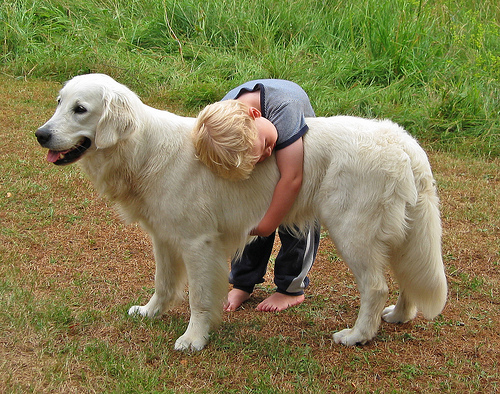Learning To Love Everything
Unconditional love is a slippery little bugger.
The basic problem is judgement. As soon as our brain screams “This guy doesn’t deserve love” or “Yes he does!” then voila, it’s no longer unconditional.
Yes, even deciding someone does deserve love is not unconditional.
But ok, let’s back up a bit. Why the hell bother with love anyway?
Several reasons:
- Being loving is the highest, happiest place we can be
- It’s healthiest for us
- It’s the best for those around us (i.e., those we care about)
Check it: think of someone you really like. Now imagine them in front of you, while you’re being the nicest you possibly can be. You’re doing something they enjoy, saying something they adore hearing, and they’re happy happy happy. How do you feel? That’s right. Unbelievable.
Now true, there’s definitely an endorphin kick to improving someone else’s life (philanthropists aren’t in it just for the tax breaks), but the real secret is that it feels great to be loving. Even more so than being loved. Now that is a surprise.
Based on modern media, you’d think the happiest you could ever be is when someone (preferably on a horse, wearing armour, maybe holding their lance) loves you.. but it’s quite possible for someone to love the hell out of you while you remain stubbornly miserable. Trust me, I’ve been there (uhh, sorry, ex-girlfriends).
Why do you think limerance, those early stages of a new relationship, feels so great? It’s not just because someone is flattering us (while forgiving our *cough* more human aspects). It’s because we’re being unconditionally loving (ie the same) to them.
Not only that, but as our new lover holds a mirror to the best parts of us, we are unconditionally loving towards ourselves. For a brief moment all the self-criticism pauses and we are truly self-loving.
Being loving is peaceful, happy and it’s zero stress. It enhances our health and makes us a hell of a lot nicer to be around. Perfectly desirable, you might say.
On the flipside, non-loving feelings feel crappy, and who wants that?
Keeping Our Brain Out Of It
Since being loving feels so great, why wouldn’t we want to feel it all the time? So how do you love consistently, without the ol’ lizard brain jumping in the way?
The trick is to make the decision to always love. Then keep reminding yourself as often as possible. This way you never have to make another “Does this person deserve love?” type decision. If your default response is to always love, you never need to think. It keeps your brain out of the picture altogether.
Now, I’m not usually a fan of either-or thinking, but in the case of love it’s useful.
Every thought or feeling can be easily divided into loving or non-loving. If it’s non-loving, we can simply let it go (I’ll explain how in a bit) and replace it with the opposite, loving feeling.
It’s the kind of assessment you can do without going via your brain: Loving is super easy to see; non-loving is everything else.
Keeping our brains out of it is critical. It stops us tying ourselves up in knots. Ye olde Keep It Simple, Sexy.
Getting Started
Best of all, it really doesn’t matter if you suck at being loving – or if you feel you’ve never experienced love. Every time you let go of a non-loving thought & decide to be (more) loving, things get a teensy bit better. It’s just a practice. Every step you take is a step in the right direction. It gets much, much easier the more you do it.
Oh, and you can always try (I did, with great success) “I love that I suck at loving”, “I love that I can’t (feel) love” and so on. Whatever feels right to you; It all helps.
As an end goal, if it was possible to be loving all the time about everything (spoiler: it is), then you’d feel great every second of every day, no matter what happened around you.
To start with, even feeling great for a moment is better than not, so it’s totally worth trying. You find joy on the journey and every step towards that goal gets more joyful, and easier.
Of course, if you consciously want to feel crappy about something, this may not be the approach for you.. but that’s ok too. Everyone chooses their own path.
“I Am Loving” vs “I Love”
Now, what I’m talking about is being in a state of loving. Ideally always, but every second helps.
English is a little tricky here, since when we say “I love cheese” we’re talking about our attitude towards cheese. “I am loving cheese” indicates a state of being. It’s a subtle difference, but an important one. Unfortunately, “I am loving” is a far more passive sentence, so it’s less useful in practical terms, but I’ll get to that in a bit.
The short version is this: it’s quite feasible to say “I am loving about this” while holding onto non-loving feelings. Remember “love the sinner, hate the sin“ (and other hypocrasies)? Yeah, that.
So even though we’re aiming for “I am loving cheese”, it’s most powerful to say “I love cheese.” Uhh, or other, you know, not-cheese stuff.
How To Do It
Right. Enough of the chit-chat, how do you do this?
It’s very simple. You remember how to let things go, right? (hint: just choose to.) You’re the boss. Every voice that pops up “Wahh, I can’t because..” well, they’re wrong. Persistent, convincing, LOUD, yes, but wrong. You’re the boss. Just keep reasserting yourself, and bit-by-bit you will reclaim your inner power.
Now, think of something you hate. Something that bugs the hell out of you, really tickles your monkey. Now say (out loud, preferably.. and tapping your karate chop point, if you feel like an extra boost):
“I love (whatever it is)”
Feel the tension rising up? Getting pissed off? Brain screaming loudly “No, I don’t love it, because….[insert whatever bullshit reasons here].”
Yeah well, guess what, that bullshit coming up is not describing the issue, it is the issue. Letting go of those thoughts & feelings is what matters. That’s the paradox, the crux of it all. You let go of those feelings and voila:
a) it doesn’t matter whether the external situation continues or not, and
b) half the time the damn thing will disappear anyway.
Crap sticks around until we learn what we need to, then it moves on.
Love is the strongest positive emotion, so invoking that is guaranteed to bring up all opposing thoughts & feelings.
Just keep saying it and keep letting go until it’s all gone and you feel loving. That’s it.
You’re The Boss Of You, Always
This whole thing is about re-asserting your authority. You’re the boss, of your thoughts and of your feelings. You’re choosing to love, so that’s the end of it. Keep choosing it, keep letting go, and all that crap will disappear, leaving you peaceful and happy. The more you do it, the happier you’ll be.
You’re the boss, remember. If you choose to love something, even if you’ve hated it your whole life, well, that’s the way it’s gonna be from now.
Also, remember, you’re doing this for you, not for (what or whomever it is).
Say someone’s really hurt you. Ok, well, that sucks, sure. But listen, you feeling crappy about it now is only hurting you. Continuing to feel non-loving about it is only harming who? Yes, you. So, choosing to be loving is choosing to feel better about it. It’s deciding that you are the boss of how you feel.. and whomever it was that hurt you doesn’t have the power to continue making you feel bad now.
You are the boss of you, not them.
When you first do this, it may seem like the toughest thing in the world to say “I love (this terrible thing)” but you’ll get the hang of it. Just stick in there. Keep reminding yourself: You’re the boss.
A lot of times, just setting the intention is all that’s needed, and those non-loving feelings will dissipate in seconds. Yes, seconds. Sometimes with messier stuff you might need to sit with it a bit, or come back to it the next day. Maybe if it’s really overwhelming throw some EFT at it, but the key is to aim for feeling genuinely loving about it.
That’s all there is to it. It’s just a choice. Like choosing to lift your arm. Seriously.
So, for all the screaming our brain does – really it’s all bullshit. It’s our amygdala, our lizard brain trying to frighten us, telling us we have to freak out or we’ll die.
It’s always bullshit. You choose how you feel.
This doesn’t mean you have to put yourself in harm’s way. You can safely cross a road, but it’s not necessary to do it quivering in fear with tears streaming down your face. Get in a loving space first, and no matter how scary the road used to be, you’ll be optimally placed to cross it in a way that is most loving for you and everyone else involved.
Yes, it can take a little practice, but that’s ok. What’s the potential downside? You stay feeling as crappy as you do now about that situation. Not much of a risk.
Loving The Big Stuff
In terms of getting started, you’ll get the biggest bang-for-your-buck by starting with the stuff that pisses you off the most. That’ll shift the most detritus, and having you feeling better the soonest.
Note above what I was saying about the subtle distinction between “I am loving” (the desired end state) and “I love this” (the most effective thing to say).
Now, there are many terrible things people do to each other, so let’s Godwin this discussion right away: What about Hitler?
11 to 17 million people killed. Jews, gypsies, blacks, Poles, Soviets, Jehovah’s Witnesses, homosexuals, the disabled… all slaughtered in cold blood. How could we possibly love that? Wow, in fact, as I write this, even thinking “I love Hitler” is bringing up emotion, and I was born 30 years after he died.
Here’s the point: Even if I was in a position to do something about Hitler, I can do it from a loving place, or a nonloving place. Guess which is better, more powerful, will yield optimal results? Yep, that’s right.
Just ask Gandhi, he kicked the British Empire out of India. They had all the guns but he had all the love.
So, the reason we’re saying (in this ridiculous example) “I love Hitler,” is because what we’re doing is bringing up every single contrary thought and emotion, no matter how deep.
“I love (whatever)” is the single most powerful statement for pulling up this junk and clearing the subconscious.
The intent here is to get to a state of unconditional loving.
- Does this mean we have to agree with what happened? No, of course not.
- Are we doing it for their benefit? No, we’re doing it for ourselves, so we feel better.
- Will it all disappear at once? Not necessarily, but every step closer is better for you.
- Does this mean we will put ourselves in harm’s way? Of course not.
Becoming loving doesn’t mean that by some magical transference we suddenly lose 50 IQ points.
Quite the opposite. When we’re cleared of muddying emotional reactions, we’re no longer reacting like amoeba – stimulus-response, stimulus-response. Being loving brings clarity.
(Now, since we’re all little energetic sending & receiving stations, ultimately it will affect the other party too, but that’s a whole other conversation)
Additionally, in order to get to that loving place, we will clear out all the pain, anger and emotional trauma we’ve built up around the situation – whether real or imagined (and our imaginations are terrible things when it comes to self-torture after a traumatic event).
Let’s say you have a crappy relationship with someone at work. Do you really believe they don’t know you’re pissed off? We’re a lot more sensitive than we realise, even if we can’t always identify why. Getting into a state of loving about that person helps you. It makes your life better, regardless of their (mis)behaviour. Additionally, how assholish do you think they’re going to be if you do genuinely love them? Ha ha, really not. They’ll pick up on that too.
As surreal as this sounds, I’ve seen this several times in my life. People who’ve absolutely hated me, or even wanted to kill me (yes, I know!) – when I got into a place of pure loving towards them (which really just meant dropping all my antagonism) the situation naturally resolved itself, without me doing anything at all. They called saying they’d missed me, or out of the blue paid for a flight for me to go see them.. or, they just up and disappeared out my life altogether – and I don’t just mean “leave” I mean, “move city” or “move country.”
Never underestimate the power of love.
So, to get a damn good start, just work through all the stuff in your life that brings up non-loving feelings. Take ’em one at a time and just say “I love this”, feeling as loving as you can manage and letting go of all internal tension. If you can’t manage that, start with “I choose to love this.” Persist. You’ll get there.
How will you know what to start with? Easy. Whatever pops in your head. Don’t save it till later, get in the habit of just doing it wherever you are, whenever. That way you’ll be dropping stuff all day every day.
Non Loving Thoughts and Feelings
Now, non-loving thoughts can be a bit harder to identify than giant chunks of things-we-hate.
The subtle thing here is – how often do we think about something? Well, it’s hard to know, isn’t it. We have tens if not hundreds of thousands of thoughts a day but how many of those are we consciously aware of? Very, very few.
Tell you what though, the emotional payload that comes with these thoughts definitely affects us. Maybe only for a fraction of a second, but boy, it adds up.
So how do you get rid of stuff you can’t even see?
Here’s one neat way. Any time you have a non-loving thought, eg, “I suck at this”, respond in four ways:
- Let go of the thought (choose to stop thinking it, imagine it floating away, whatever works for you)
- Repeat “I love the part of me that sucks at this”, and release all tension
- Repeat “I love sucking at this”, and release all tension (ho ho, this is a goodie)
- Finally, emphasise “I rock at this!”, releasing all tension.
Do this till you feel great.
Note the subtle variations in two and three. Not just loving the thought, but also any beating yourself up that came with it.
The phrase “I love the part of me that…” is super helpful here. It helps dissociate yourself from whatever-it-is, just enough to help let things go.
The trick, as I said, is the unconditional bit. Leave judgement at the door, ignore the why or why not and do it for everyone and everything. Get out of your head and into your heart.
Additionally, don’t worry too much about trying to figure any of it out. If you have an icky feeling, just say “I love this icky feeling” and let it go, without trying to nut out what it’s about or why. It’s much more effective.
I’m finding that often if I’m be feeling lethargic (say), I can spend a couple of hours trying to get to the bottom of why I’m lethargic and maybe figure it out. Alternatively, I can just say “I love that I’m feeling lethargic” and it floats away relatively effortlessly, without me ever having any idea what it was about. And really, if it’s gone, then who cares why?
I’ve been doing this for the last couple of months now, and every day is getting better than the one before. There’s a ton of related stuff I’ve discovered that ties into this but I’ll cover that later. This is the core. Do this one simple thing (love everything) and you’ll be amazed at how much better you feel, as you love all those non-loving thoughts & feelings away, and life gets exponentially better.
If you have trouble remembering the details, just do this: Any thought or feeling that arises, simply say “I love the part of me that…(whatever it is)” and let go of all tension that arises. Feelings come up because they want to leave. Repeat until you feel loving.
Give it a shot. See how you feel. Guaranteed you feel better, in exchange for almost no effort at all. How loving is that?








